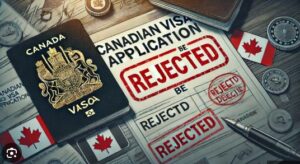Applying for a Canadian visa can be a rigorous process, and many hopeful applicants often face rejection for reasons they may not fully understand.

While Canada welcomes immigrants, students, and tourists from around the world, its immigration officers are tasked with ensuring that only qualified and genuine applicants are granted entry.
From financial capability to travel history and documentation accuracy, several factors can affect the outcome of your visa application.
In this article, we’ll explore seven common reasons Canadian visa applications get rejected, helping you avoid these pitfalls and better prepare for a successful application.
1. Proof of Finances and Source of Funds
To solidify your chances of visa approval to Canada, your inflow and outflow of cash would have to clearly prove that you’re financially capable of supporting your trip or stay in Canada. Your source of funds should also be crystal clear and legal.
2. Limited job opportunities in your home country
In a situation where the interviewing officer suspects that you’re using Canada as an escape route with no plans of returning to your home country due to a lack of employment, the officer can decide not to approve your visa.
3. Inadequate and inaccurate papers
All documents provided must be up-to-date and valid to ensure visa approval. You must be well informed about the supporting documents needed for your visa approval and provide all documents.
4. Purpose of visit
Anyone with intent of visiting or permanently residing in Canada must have a solid reason to back up their intent. Visas to Canada could be denied on the basis of ‘lack of purpose’. What this means, in other words, is that there has to be a good reason for you to want to move permanently or visit Canada.
5. Travel History
People with no travel history outside their native country are more likely to have their visa application denied. People who have been outside the borders of their native nation have a higher chance of getting their visa approved.
6. Family ties
A lack of family ties in your native country could be a red flag for the officers and result in visa denial. Whoever intends to travel to Canada is expected to have solid family ties back home in their native country.
7. Health complications
People with severe health issues that could endanger others are denied visas often, if not always.

 Gistfox Your News Window To The World
Gistfox Your News Window To The World 




